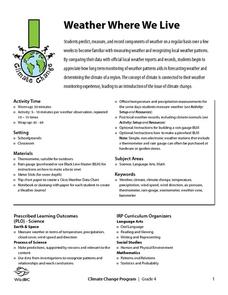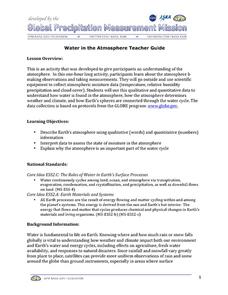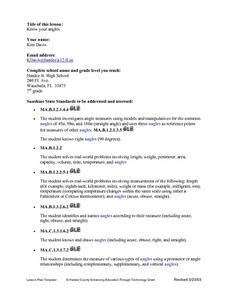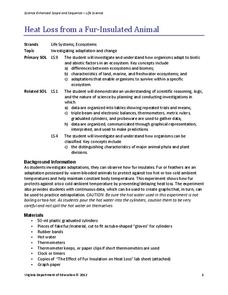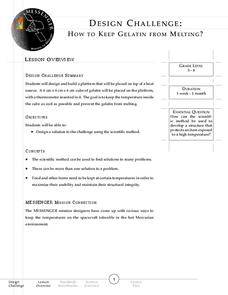Curated OER
Permafrost
Students use a thermometer to analyze soil temperature data to determine which soil sample is normal, and which one is permafrost. In this permafrost lesson plan, students participate in a hands on activity where they identify the active...
Weather Bug
WeatherBug
Exploring the weather has never been more intriguing! Whether you are looking for a quick glance at the 10-day forecast, trying to figure out if lightning is heading your way, or wondering what the pollen count is, you will find out...
Virginia Department of Education
Macromolecules
Finally, a chance for the class to play with their food! Allow pupils to simulate stomach acid with common foods, and introduce specific macromolecules into the mixture to explore characteristics of carbohydrates, lipids, and proteins....
Curated OER
The Great Heat Escape
Students observe a demonstration on the role of thermal conductivity in heat transfer. In this thermal conductivity instructional activity, students design and conduct an experiment to compare the thermal conductivity of four...
Curated OER
Accurately Measure Body Temperature
Students in an occupational health careers classroom review and practice finding temperature using a thermometer. They practice converting Celsius to Fahrenheit and from Fahrenheit to Celsius. They take each other's temperature and...
Curated OER
Climate and Temperature
Students explore what the soil temperature would be on the north and south sides of a building. In this temperature lesson, students hypothesize what the results will be using a thermometer and then after a week see what the temperatures...
Curated OER
Weather Instruments
Third graders practice making predictions about weather from conditions they observe on weather instruments and weather reports. Learners are introduced to the most basic weather reporting instruments: the thermometer, the wind vane, the...
Resource Room
Multisensory Teaching: Positive and Negative Integers
Working with thermometers, sixth graders compare the value of positive and negative numbers. Plenty of teacher suggestions and independent practice ideas are presented. This website links to two more parts in this first of three integer...
Wild BC
Weather Where We Live
Over a span of two weeks or more, mini meteorologists record weather-related measurements. What makes this particular resource different from others covering similar activities are the thorough details for the teacher and printables for...
Curated OER
Weather Watchers
Students identify basic weather instruments and how they are used to record weather data. Students define several vocabulary terms as stated in lesson. Students use basic instruments to record weather data in their area. Students use the...
Curated OER
Green Team
Student explore the relationship of static electricity to current electricity, circuits, electromagnets, electro generators, and public electric utilities. In this Green Team lesson plan, 4th graders participate in hands-on science...
Lake Afton Public Observatory
Shadows, Angles, and the Seasons
Shine some light on the topic of seasonal change with this collection of activities. Whether it's by measuring the change in the length of their shadows, or modeling the earth's orbit around the sun using a lamp and a globe, these simple...
wayback.archive.org
Prefixes and Suffixes in Biology Terms
Here is a challenging and cross-curricular worksheet, great for learners in biology or English class. They underline the prefix and/or suffix in each of 15 words and define them. Then, they use their prefix and suffix list to write the...
Curated OER
Water in the Atmosphere
A slide show serves as the backdrop for a instructional activity on the moisture in Earth's atmosphere. Through it, mini meteorologists learn about the attributes of the atmosphere and actually use data-collecting weather tools to make...
Institute of Electrical and Electronics Engineers
Keep it Cool
This cool lesson plan is ideal for elementary engineers or physical scientists, especially when learning about heat transfer and insulation. After reading a page of background information, engineering teams collaborate to design and...
Curated OER
Greenhouse Gases
Although the worksheet for the lab activity is not included, this is an activating activity for your class to do when learning about the greenhouse effect. They lay three thermometers underneath a lamp: one out in the open, one under a...
Curated OER
A Device That Condenses Water
Fifth graders who are studying water vapor and the condensation process use this worksheet to help them understand the process of condensation. Most of the worksheet is simply a source of information, with a good descriptive paragraph...
Curated OER
What are Metamorphic Rocks and How are They Formed?
Even though the student handouts are not included in the write-up, this lesson contains the instructions for terrific activities to use when teaching middle schoolers about metamorphic rocks. First, they compare granite to gneiss and...
Curated OER
Know Your Angles
Explore types of angles and the characteristics of each. After observing a PowerPoint Presentation, learners tour the school facilities and use a digital camera to capture prescribed angles. Using the digital pictures and written...
Texas State Energy Conservation Office
Investigation: Building a Parabolic-Trough Collector
Amateurs of alternative energy build a mini parabolic-trough solar energy collector and use it to heat water. Temperature is recorded over a three-minute period and the data is graphed and analyzed. Note that in order to paint aquarium...
Virginia Department of Education
Heat Loss from a Fur-Insulated Animal
How do animals adapt to weather changes? Provide your class with the ability to understand adaptations and body temperature as they participate in this hands on experiment, using fake fur and hot water. Pupils collect data and analyze...
Messenger Education
Design Challenge: How to Keep Gelatin from Melting
The inside of the spacecraft Messenger, which explores Mercury, will experience temperatures from 32 to 91 degrees Fahrenheit. In the final installment of a series of four space-related activities, groups spend time discussing and...
University of Georgia
The Power of Peanuts
Measure the amount of energy in a peanut by igniting a chemical reaction. Classes use a laboratory setup to burn a peanut and measure the amount of heat it releases through a temperature analysis. They calculate the number of Joules of...
American Chemical Society
The Energy Efficiency of Heating Water
Can a small change in laboratory procedures save energy? Scholars test three different methods for heating water in a science lab. Then, they calculate the energy efficiency for each and compare them to determine which uses the least...










